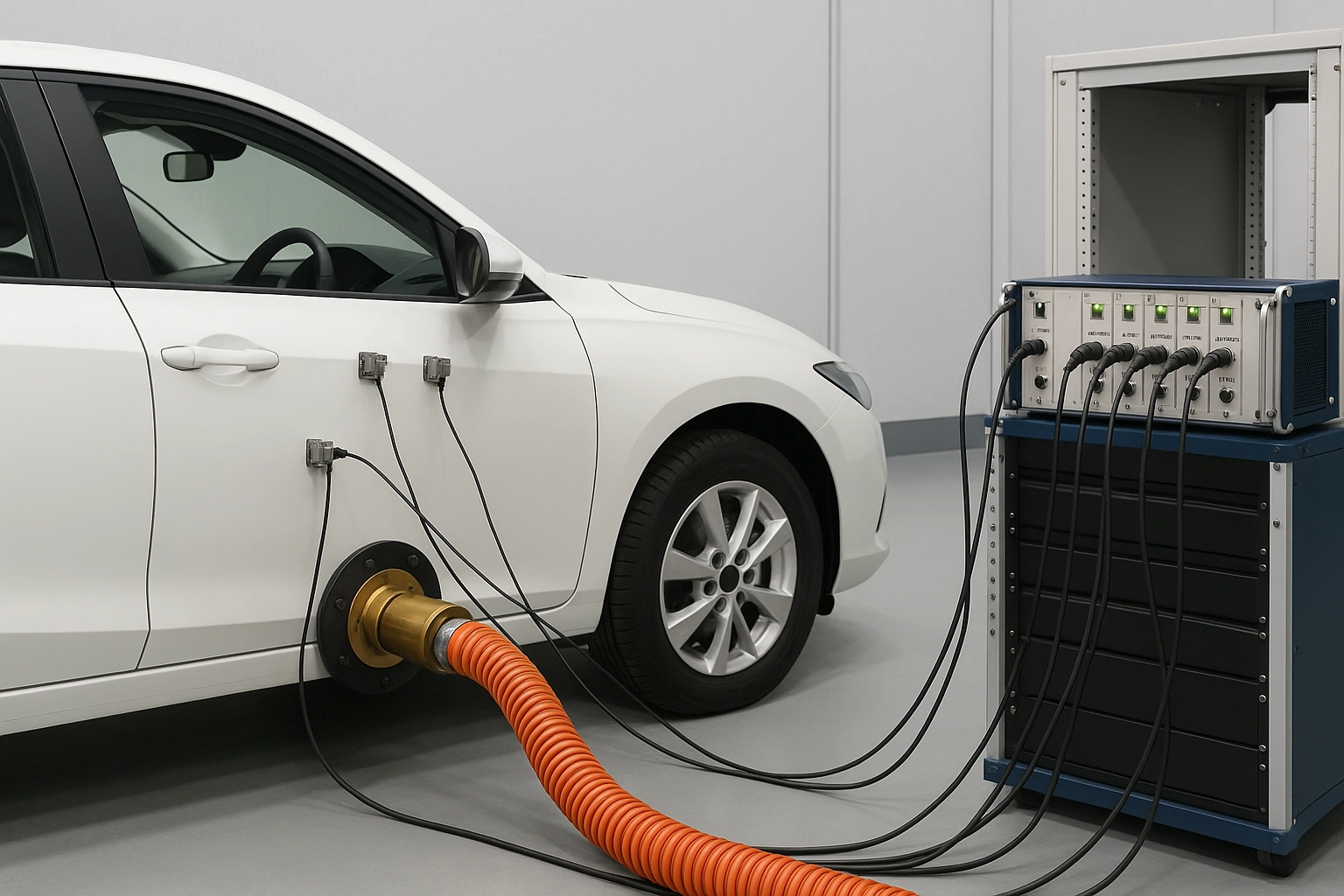IEC 60942 Sound Calibrator Performance Verification Test
The IEC 60942 Sound Calibrator Performance Verification Test is a critical process in ensuring the accuracy and reliability of sound calibrators used across various industries. This test is essential for maintaining the integrity of noise, vibration, and harshness (NVH) testing within automotive manufacturing and other sectors where precise measurement of sound levels is paramount.
The IEC 60942 standard defines a set of procedures to verify that sound calibrators are functioning correctly. This includes checking their frequency response, output stability over time, temperature effects on performance, and linearity with respect to input signals. By adhering strictly to these standards, laboratories can provide clients with confidence in the accuracy of their calibration services.
In automotive testing specifically, accurate sound calibrator performance verification is crucial for ensuring that vehicles meet stringent noise regulations set forth by organizations like the European Union's New Worldwide harmonized Light vehicle Test Procedure (NRL) or the United States' Corporate Average Fuel Economy (CAFE) standards. Misaligned calibrators can lead to discrepancies in testing results, which could result in non-compliance penalties and reputational damage for manufacturers.
The test procedure involves several steps:
- Frequency response checks
- Output stability tests
- Temperature coefficient measurement
- Linearity determination between input and output signals
These checks ensure that the calibrator maintains its accuracy throughout its operational range, thus minimizing errors in subsequent noise measurements. For instance, a car undergoing NVH testing should produce consistent readings regardless of environmental conditions or test frequency.
Accurate sound calibrators are particularly important during development phases when engineers need precise data to refine product design. They also play a vital role in quality assurance processes where compliance with international standards must be demonstrated. The IEC 60942 test ensures that the calibration tool itself does not introduce variability into these critical evaluations.
Compliance with this standard is mandatory for laboratories that intend to provide calibration services as per IEC or ISO specifications. Non-compliant calibrators could invalidate any subsequent testing results, leading to potential legal issues and financial losses for both the laboratory and its clients.
Benefits
Conducting an IEC 60942 sound calibrator performance verification test offers numerous benefits. Firstly, it enhances the reliability of calibration services by ensuring that all sound calibrators meet stringent accuracy requirements before use. This reduces the risk of false positives or negatives in testing results, thereby improving overall product quality.
Secondly, compliance with this standard helps laboratories maintain their credibility and reputation within the industry. Clients trust compliant labs more because they know that the laboratory adheres to recognized international standards. Thirdly, regular verification of calibrators prevents drift over time, which could otherwise lead to inaccuracies in long-term testing programs.
For automotive manufacturers, accurate sound calibrator performance verification is especially important for meeting regulatory requirements and ensuring product safety. It allows them to demonstrate compliance with relevant noise regulations while also providing valuable insights into vehicle acoustics that can be used to improve future designs.
In summary, the IEC 60942 test provides peace of mind knowing that calibration tools are performing as expected, which ultimately leads to better products and more efficient operations across various industries.
Industry Applications
The IEC 60942 sound calibrator performance verification test finds application in several key areas:
- Automotive Manufacturing: Ensuring that NVH testing equipment is accurate and consistent, which contributes to safer vehicles.
- Aerospace Engineering: Validating the accuracy of sound measurement tools used during design and certification processes.
- Consumer Electronics Production: Guaranteeing that audio devices meet quality standards set by industry bodies like IEC or IEEE.
- Acoustic Research: Supporting scientific research into sound propagation, noise control, and acoustics in various environments.
In each of these fields, the ability to trust calibrated measurements is paramount. By adhering to the IEC 60942 standard, laboratories can ensure that their clients receive reliable results, fostering confidence and trust within the industry.
Environmental and Sustainability Contributions
The accurate measurement of sound levels plays a significant role in environmental protection efforts. By ensuring that sound calibrators are working correctly through IEC 60942 performance verification tests, laboratories contribute to more efficient noise control measures.
- Reduction in Noise Pollution: Accurate measurements help identify sources of excessive noise and guide interventions aimed at reducing it.
- Energy Efficiency: Understanding how sound propagates through different materials aids in designing quieter, energy-efficient products.
- Biodiversity Preservation: Minimizing disruptive noises helps preserve natural habitats for wildlife.
The IEC 60942 test ensures that the tools used to measure these parameters are reliable and consistent, thereby supporting sustainable practices in multiple sectors. Thus, laboratories play a crucial role in promoting environmental stewardship through precise measurement techniques.





